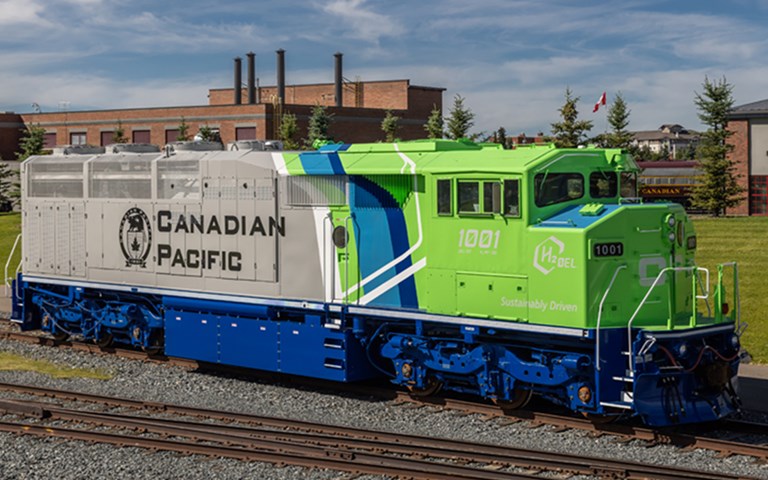CPKC has been developing its hydrogen-powered locomotives as part of its goals to reduce greenhouse gas emissions. Courtesy of CPKC.
A new long-term rail agreement has been reached between Teck Resources and Canadian Pacific Kansas City (CPKC) to test hydrogen-powered locomotives in the transport of steelmaking coal from Teck’s Elk Valley coal operations in southeastern B.C. to western ports.
The pilot program, which is the first of its kind in Canada, will start in 2024 and run until the end of 2026.
Both companies said the pilot will help reduce greenhouse gas emissions in the steelmaking coal supply chain.
“CPKC is proud to work with organizations such as Teck that share our passion to be leaders for a sustainable future as we look to take the next step in the development of our innovative hydrogen locomotive program,” said Keith Creel, CPKC president and CEO, in a May 4 press release.
CPKC first announced production in 2020 of a retrofitted line-haul locomotive modified with hydrogen fuel cells and battery technology to drive the locomotive’s electric traction motors. Due to a $15 million grant from Emissions Reduction Alberta in 2021, the company expanded the program to develop three hydrogen-powered locomotives in total, converting an additional line-haul locomotive and a yard switcher locomotive.
It is also constructing two hydrogen production and refuelling stations at CPKC rail yards in Alberta. Testing has been under way on the locomotives since 2022. No details have been released on how many locomotives will be involved in the pilot project or whether more fuelling facilities will be built.
CPKC has a goal of reducing its greenhouse gas emissions intensity linked to locomotive operations by 38.3 per cent by 2030, according to its climate action strategy. Diesel-powered units are the standard for railway operators in North America, which represent that industry's most significant source of greenhouse gas emissions.
“The agreement complements our Neptune Terminals investment and other secured West Coast port capacity to support the efficient movement of our high-quality Canadian steelmaking coal to our global customers,” said Jonathan Price, Teck’s CEO, in the May 4 press release. He also stated the agreement supports Teck’s climate action strategy. The company, which has committed to net-zero carbon emissions by 2050, is also exploring how to spin off its coal assets.
By 2030, Teck aims to reduce the carbon intensity of its operations by 33 per cent using its 2020 output as a baseline. To reduce its Scope 3 emissions generated by the transport of its products, the company is similarly working with its marine shipping partners through the adoption of electrification and energy efficiency measures.
Both companies said they will also invest in technology and infrastructure to strengthen the resilience of the steelmaking coal supply chain.




